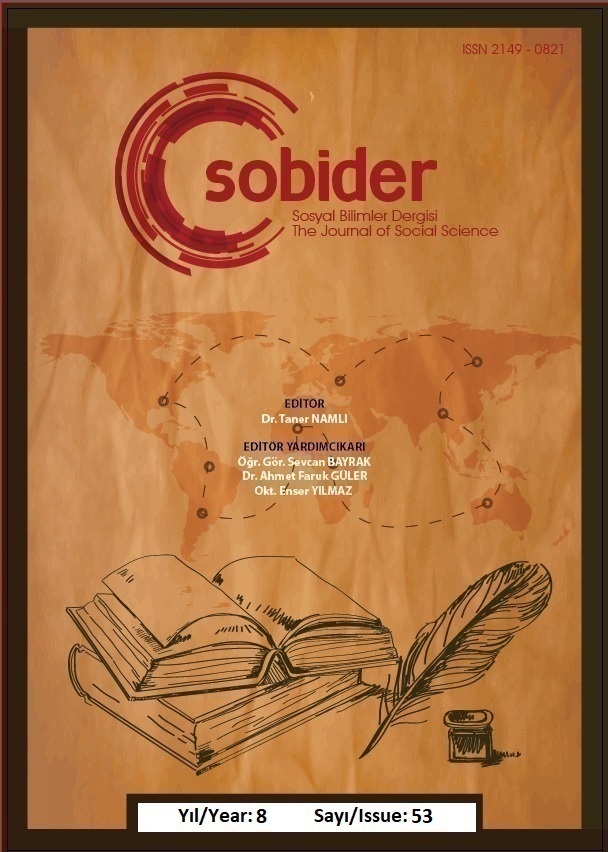Author :
Abstract
Son günlerde tüm Dünya’yı temelden sarsan Covid-19 salgını birçok alanda etkisini göstermektedir. Bunların en başında da ülkemizi yakından ilgilendiren eğitim gelmektedir. Eğitimin en temel unsurunu oluşturan bireyler, öğretmenlerdir. Bu araştırmada Covid-19 sürecinde öğretmenlerin salgın ve salgın süreci ile ilgili görüşlerini belirlemek amaçlanmıştır. Bu nedenle araştırma, nitel araştırma yöntemlerinden olgu bilim (fenomenoloji) ile yürütülmüştür. Araştırmayı Muş ilinden rastgele seçilen farklı branşlardan 7 öğretmen oluşturmaktadır. Araştırmanın verileri yarı yapılandırılmış görüşme formu ile Zoom üzerinden yapılan görüşmelerle toplanmıştır. Toplanan veriler, içerik analizi ile analiz edilmiştir. Analiz sonucunda öğretmenlerin salgın ve aşıya dair belli bir bilgi düzeyine sahip oldukları, aşı olma konusunda genellikle olumlu bir tutum sergiledikleri belirlenmiş. Karantina ve salgın sürecinin öğretmenleri genel anlamda olumsuz etkilediği tespit edilmiştir. Bununla beraber öğretmenler açısından öğrenciler bu süreçte fırsat eşitsizliği, alt yapı yetersizliği gibi etmenler yüzünden uzaktan eğitim sürecinden yeterince yararlanamamış ancak normalleşme sürecine genel olarak çabuk adapte oldukları belirtilmiştir.
Keywords
Abstract
Covid-19 epidemic, which has been shaking up the world lately, shows its impact in many areas. Education is the forefront of these areas that closely related to our country. Teachers are the individuals who constitute the most basic element of education. This research is aimed to specify teachers’ views about epidemic and its process in the covid-19 period. Therefore, this research is carried out with phenomenology from qualitative research methods. The research consists of 7 teachers from different branches randomly selected from the province of Muş. The research’s data gathered with semi-structured interview form by the conversations that were made via Zoom. The collected data were analyzed by content analysis. As a result of analysis, it is examined that teachers have a certain level of knowledge about epidemic and vaccine, and they generally have a positive attitude about getting vaccinated. It is determined that quarantine and epidemic process generally affected teachers negative. With this, it was stated that, in terms of teachers, students could not benefit from the distance education process sufficiently because of the factors such as inequality of opportunity and insufficient infrastructure, but they generally adapted quickly to the normalization process.
Keywords
- Akat, M.,& Karataş, K. (2020). PsychologicalEffects of COVID-19 Pandemic on SocietyandItsReflections on Education. Electronic TurkishStudies, 15(4).
- Akyavuz, E. K.,& Çakın, M. (2020). Covid-19 Salgınının Eğitime EtkisiKonusunda Okul Yöneticilerinin Görüşleri. Electronic TurkishStudies, 15(4). Bakioğlu, B.,& Çevik, M. (2020). COVID-19 Pandemisi Sürecinde Fen Bilimleri Öğretmenlerinin Uzaktan Eğitime İlişkin Görüşleri. Electronic TurkishStudies, 15(4). Bozkurt, A. (2020). Koronavirüs (Covid-19) pandemi süreci ve pandemi sonrası dünyada eğitime yönelik değerlendirmeler: Yeni normal ve yeni eğitim paradigması. Açıköğretim Uygulamaları ve Araştırmaları Dergisi, 6(3), 112-142 Dikmen, M. COVID-19 Salgınında Üniversite Öğrencilerinin Depresyon Düzeylerinin Sosyal Medya Bağımlılığı Üzerindeki Rolünün İncelenmesi: Bir Yapısal Eşitlik Modeli. Bağımlılık Dergisi, 22(1), 20-30.
- Karasar, N. (2020). Bilimsel Araştırma Yöntemi: Kavramlar, ilkeler, teknikler. 35.bs. Ankara: Nobel Akademik Yayıncılık.
- Kılıç,O. (2020) Tarihte Küresel Salgın Hastalıkla ve Toplum Hayatına Etkileri .Küresel salgının anatomisi: insan ve toplumun geleceği. Türkiye Bilimler Akademisi.
- Kıncal, R. Y. (2017). Bilimsel Araştırma Yöntemleri, 5. bs. Ankara: Nobel Akademik Yayıncılık. Kızılok, G.E. (2021). Covıd-19 salgın sürecinde öğretmenlerin stres kaynakları ve davranışsal bağımlılık eğilimlerinin incelenmesi. (Yüksek Lisans Tezi). Van Yüzüncü Yıl Üniversitesi Eğitim Bilimleri Enstitüsü, Van. MEB (2020) http://tegm.meb.gov.tr/www/telafide-ben-de-varim-programi-usul-ve-esaslariyayinlandi/icerik/721(Erişim: 18.06.2021) Okyay, P. Covıd-19 Aşı Çalışmaları. Türk Tabipler Birliği Altıncı Ay Değerlendirme Raporu Özer M. & Eren Suna H. (2020) Covid-19 Salgını Ve Eğitim Küresel salgının anatomisi: insan ve toplumun geleceği. Türkiye Bilimler Akademisi. Özer, M. (2020). Thecontribution of thestrengthenedcapacity of vocationaleducationandtrainingsystem in Turkeytothefightagainst Covid19. Yükseköğretim Dergisi, 10(2), 134-140. Şeker, M., Özer, A., & Korkut, C. (Eds.). (2020). Küresel salgının anatomisi: insan ve toplumun geleceği. Türkiye Bilimler Akademisi. T.C. Sağlık Bakanlığı. (2019) Pandemikİnfluenza Ulusal Hazırlık Planı. Erişim: https://grip.gov. tr/depo/saglik-calisanlari/ulusal_pandemi_plani.pdf (Erişim: 15.06.2021) T.C. Sağlık Bakanlığı. (2020) Türkiye’de güncel durum. Erişim: https://covid19.saglik.gov.tr/ (Erişim: 15.06.2021)
- WHO.(2020) Emsalsiz bir yıl: DSÖ'nün COVID-19 tepkisi (who.int).pdf (Erişim : 18.06.2021)
- Yıldırım, A. & Şimşek, H. (2013). Sosyal bilimlerde nitel araştırma yöntemleri. (9. Baskı). Ankara: Seçkin Yayıncılık. Yıldız, A.,& Vural, R. A. (2020). Covid-19 pandemisi ve derinleşen eğitim eşitsizlikleri. TTB Covid-19 Pandemisi Altıncı Ay Değerlendirme Raporu (556-565).





